|
|
|
Sort Order |
|
|
|
Items / Page
|
|
|
|
|
|
|
| Srl | Item |
| 1 |
ID:
187261
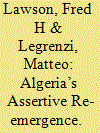

|
|
|
|
|
| Summary/Abstract |
Algeria is re-emerging as an active player in international politics following the Arab Spring uprisings that swept across the Middle East and North Africa beginning in 2010–11. But it has adopted a much different posture from the one it maintained during the 1960s and 1970s. The broadly accommodative attitude that Algiers previously exhibited towards the outside world has been replaced by a more combative stance. Military power has become its primary tool for managing inter-state disputes, and Algeria has stepped up its involvement in the domestic affairs of nearby states. These changes have contributed to the resurgence of conflict in North Africa at a moment when the regional order might well have moved in a more peaceful direction.
|
|
|
|
|
|
|
|
|
|
|
|
|
|
|
|
| 2 |
ID:
187256
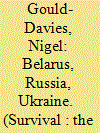

|
|
|
|
|
| Summary/Abstract |
Belarus’s recent arc offers three wider lessons for winding down the present international crisis over the Russia–Ukraine war and for planning the post-war order. Firstly, highly personalistic rule is prone to error. The flagrancy of Belarusian leader Alyaksandr Lukashenka’s electoral rigging ignited popular indignation, and the extreme brutality of the ensuing crackdown fanned popular outrage. Secondly, and paradoxically, autocracy is strong. Lukashenka’s tight control over all institutions of the state enabled him to prevent elites from defecting or losing the will to resist. Thirdly, ambiguities and compromises are unstable, and must sooner or later give way to clarifying choices. The post-war order must embed decisive outcomes, not unsustainable compromises. The West’s challenge is to enmesh a stable Ukraine in a wider peace that, for the third time in a century, builds a durable security order in Europe.
|
|
|
|
|
|
|
|
|
|
|
|
|
|
|
|
| 3 |
ID:
187262
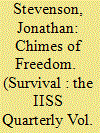

|
|
|
|
|
| Summary/Abstract |
In The Free World: Art and Thought in the Cold War, Louis Menand tests the proposition that the West’s victory in the Cold War might have been a bigger win on the cultural level than it was on the political and military ones. Nuclear dread does not pervade his narrative, and he handles strategic affairs interstitially. During the Cold War, he suggests, the United States and the Soviet Union exploited the human foibles illuminated by modern literature on a grand scale. Visual art, for its part, elevated and framed American capitalism as a cultural as well as an economic monolith. The US government, including the CIA, sought to weaponise Western culture, but Menand concludes that its unaided power was far greater than any government instrument’s. Art may now be less useful or powerful as a tool of cultural warfare than it was in the latter part of the twentieth century.
|
|
|
|
|
|
|
|
|
|
|
|
|
|
|
|
| 4 |
ID:
187254
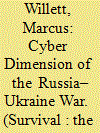

|
|
|
|
|
| Summary/Abstract |
The cyber dimension to the Russia–Ukraine war has been extensive. It reveals the characteristics of modern cyber conflict between well-matched states. While its predominant component has been a massive online ‘information’ battle for hearts and minds, comprehensibly amplified by private cyber-vigilante individuals and groups, it has also involved a large and concerted Russian campaign to disrupt Ukrainian critical infrastructure. This has been largely blunted by the soundness of Ukrainian cyber security, bolstered by Western assistance. Nevertheless, the risk remains that the cyber conflict could escalate beyond cyberspace to a more widespread confrontation between Russia and NATO. The chances of this happening are increased by uncertainty over the true nature of cyber operations, their responsible use, and especially how international law applies to them, making the efforts of states to address these issues urgently needed.
|
|
|
|
|
|
|
|
|
|
|
|
|
|
|
|
| 5 |
ID:
187259


|
|
|
|
|
| Summary/Abstract |
Efforts to accelerate the energy transition are essential. But rising demand for renewables and constrained supply of low-carbon technologies and critical resources mean green investment costs are already on the rise. The phenomenon of greenflation will introduce new geopolitical risks and exacerbate risks already associated with the energy transition. In the West, populist movements may seize on greenflation to reject net-zero emissions goals, testing national and international coalitions. However, it is the world’s poorest states that can expect to be most adversely affected by greenflation and by wealthy states’ protectionist responses. Meanwhile, states rich in critical resources will gain new geopolitical prominence as major economies court them to boost supply. Ultimately, greenflation could undermine the principal remaining strand of cooperation between China and the West – their common interest in stemming climate change. Competition, rather than cooperation, looks like greenflation’s likeliest result.
|
|
|
|
|
|
|
|
|
|
|
|
|
|
|
|
| 6 |
ID:
187255
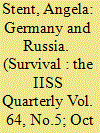

|
|
|
|
|
| Summary/Abstract |
Following Russia’s invasion of Ukraine, German Chancellor Olaf Scholz appeared to jettison 50 years of Ostpolitik by pledging financial and military support for Ukraine, sanctioning Russia and promising to spend more on defence. Seven months into the war, progress on the German Zeitenwende (turning point) is mixed. Germany has sustained far-reaching sanctions and is grappling with weaning itself off Russian energy, but military deliveries to Ukraine have been slow. The German public continues to support Ukraine, but as winter approaches that support could erode, since Russia has tied future gas deliveries to the lifting of sanctions.
|
|
|
|
|
|
|
|
|
|
|
|
|
|
|
|
| 7 |
ID:
187257
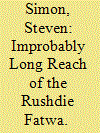

|
|
|
|
|
| Summary/Abstract |
More than 33 years after Ayatollah Ruhollah Khomeini issued the extraordinary fatwa calling for Salman Rushdie’s death for blaspheming Islam in The Satanic Verses, a Lebanese-American man attacked and badly injured Rushdie in upstate New York. Although the attacker may have drawn some inspiration from Iran’s hostility towards Rushdie, and the attack did coincide with the discovery of Iranian plots to assassinate American officials in retaliation for the killing of Qasem Soleimani, there is no evidence that Iran or any Iranian proxy was involved, and there seemed to be no information about active threats. Iran’s response to the attack was malicious and provocative, but its condemnation of blasphemy is hardly unique or surprising. It is unrealistic for some Western commentators and officials to conclude that Iran’s vendetta against Rushdie means it cannot be trusted to abide by a revived Joint Comprehensive Plan of Action.
|
|
|
|
|
|
|
|
|
|
|
|
|
|
|
|
| 8 |
ID:
187260


|
|
|
|
|
| Summary/Abstract |
Ten years after the attacks in Benghazi that killed US Ambassador J. Christopher Stevens and three other Americans, Libya is again on the brink of a civil war. The attacks sapped the United States’ willingness to engage on Libya, leaving room for external actors to pursue their own agendas in the country. Four problematic narratives emerged, including one from former president Barack Obama himself, who declared that ‘failing to plan for the day after’ the intervention in Libya was the worst mistake of his presidency. Despite American reluctance to deeply engage in addressing Libya’s political and security disorder, the Biden administration could take several practical steps to help bring stability to a potentially prosperous country. These include limiting foreign interference and sanctioning one of Libya’s most polarising actors, Khalifa Haftar.
|
|
|
|
|
|
|
|
|
|
|
|
|
|
|
|
| 9 |
ID:
187258
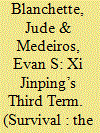

|
|
|
|
|
| Summary/Abstract |
During his first ten years in power, Chinese leader Xi Jinping has overseen substantial shifts in China’s political system and domestic economy, while also adopting a more activist and forceful foreign policy. With his likely third term beginning after the 20th Party Congress in October 2022, key questions remain about how his agenda will evolve. This article offers an assessment of Xi’s third term based on the key drivers and characteristics of Xi’s approach to domestic governance and foreign policy over the last two decades. It also explores how growing tensions and trade-offs will force policy shifts or otherwise constrain China’s growth. China seems likely to become more insular and self-referential, more frustrated and indignant and, ultimately, more alienated from the international community.
|
|
|
|
|
|
|
|
|
|
|
|
|
|
|
|
|
|
|
|
|